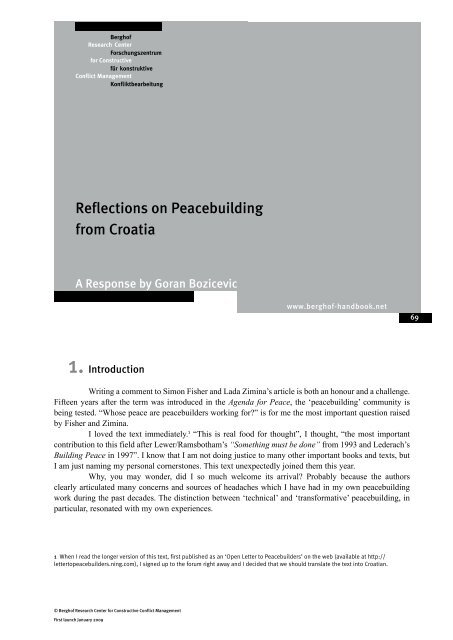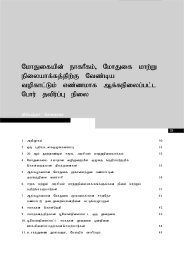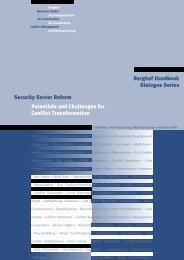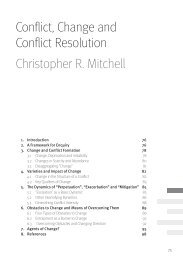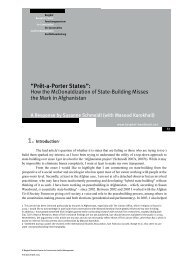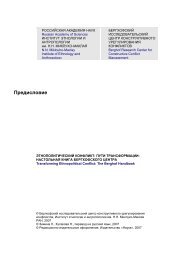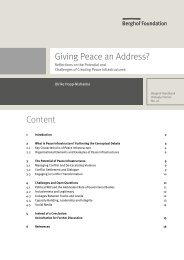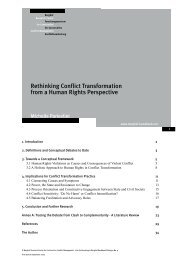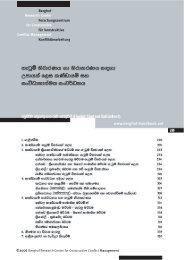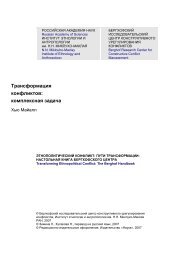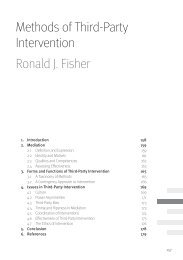Reflections on Peacebuilding from Croatia - Berghof Handbook for ...
Reflections on Peacebuilding from Croatia - Berghof Handbook for ...
Reflections on Peacebuilding from Croatia - Berghof Handbook for ...
You also want an ePaper? Increase the reach of your titles
YUMPU automatically turns print PDFs into web optimized ePapers that Google loves.
<str<strong>on</strong>g>Reflecti<strong>on</strong>s</str<strong>on</strong>g> <strong>on</strong> <strong>Peacebuilding</strong><br />
<strong>from</strong> <strong>Croatia</strong><br />
A Resp<strong>on</strong>se by Goran Bozicevic<br />
1. Introducti<strong>on</strong><br />
© <strong>Berghof</strong> Research Center <strong>for</strong> C<strong>on</strong>structive C<strong>on</strong>flict Management<br />
First launch January 2009<br />
www.berghof-handbook.net<br />
Writing a comment to Sim<strong>on</strong> Fisher and Lada Zimina’s article is both an h<strong>on</strong>our and a challenge.<br />
Fifteen years after the term was introduced in the Agenda <strong>for</strong> Peace, the ‘peacebuilding’ community is<br />
being tested. “Whose peace are peacebuilders working <strong>for</strong>?” is <strong>for</strong> me the most important questi<strong>on</strong> raised<br />
by Fisher and Zimina.<br />
I loved the text immediately. 1 “This is real food <strong>for</strong> thought”, I thought, “the most important<br />
c<strong>on</strong>tributi<strong>on</strong> to this field after Lewer/Ramsbotham’s “Something must be d<strong>on</strong>e” <strong>from</strong> 1993 and Lederach’s<br />
Building Peace in 1997”. I know that I am not doing justice to many other important books and texts, but<br />
I am just naming my pers<strong>on</strong>al cornerst<strong>on</strong>es. This text unexpectedly joined them this year.<br />
Why, you may w<strong>on</strong>der, did I so much welcome its arrival? Probably because the authors<br />
clearly articulated many c<strong>on</strong>cerns and sources of headaches which I have had in my own peacebuilding<br />
work during the past decades. The distincti<strong>on</strong> between ‘technical’ and ‘trans<strong>for</strong>mative’ peacebuilding, in<br />
particular, res<strong>on</strong>ated with my own experiences.<br />
1 When I read the l<strong>on</strong>ger versi<strong>on</strong> of this text, first published as an ‘Open Letter to Peacebuilders’ <strong>on</strong> the web (available at http://<br />
lettertopeacebuilders.ning.com), I signed up to the <strong>for</strong>um right away and I decided that we should translate the text into <strong>Croatia</strong>n.<br />
69
Goran Bozicevic<br />
2. ‘Technical’ vs. ‘Trans<strong>for</strong>mative’ <strong>Peacebuilding</strong>: From Pers<strong>on</strong>al<br />
Experience<br />
Five years ago, <strong>on</strong>e participant <strong>on</strong> the Peace Studies programme in Zagreb asked me what<br />
had been most difficult in my work at the Volunteer Project Pakrac, in the destroyed and divided<br />
town of Pakrac, <strong>Croatia</strong> between 1993 and 1995. 2 My answer then was: “peace activists/workers<br />
coming <strong>from</strong> the West and telling me/us what we should do and what local people need. Coming<br />
with brilliant instant soluti<strong>on</strong>s and ideas, ready to be recorded with their cameras.”<br />
Fisher and Zimina are not exactly talking about this bunch of people – naive idealists<br />
who are sometimes a danger with their lack of cultural sensitivity, but mostly lack the resources or<br />
influence to do real harm. Still, these people were able to suck away energy while visiting others<br />
like us, who were living and working <strong>on</strong> the ceasefire line, fixing ruins while actually using that as<br />
an entry point to a wounded community and <strong>for</strong> trust-building.<br />
But to tell the truth, my most difficult c<strong>on</strong>flicts were not with these visiting idealists.<br />
Surprisingly, they were not even with political extremists, radicals, aggressive war veterans suffering<br />
<strong>from</strong> Post-Traumatic Stress Disorder (PTSD) or any<strong>on</strong>e else who expressed hate towards me/<br />
us – people working across the line of separati<strong>on</strong>, working <strong>on</strong> peace with <strong>for</strong>mer enemies, helping<br />
the other side who had hurt them most. The relati<strong>on</strong>ship with them, my value-system opp<strong>on</strong>ents,<br />
was not always smooth or caring, but I always looked at ‘them’ as <strong>on</strong>e of the main reas<strong>on</strong>s <strong>for</strong> my<br />
peacebuilding work.<br />
No, the deepest wounds were inflicted by c<strong>on</strong>flicts with colleagues subscribing to a<br />
‘technical peacebuilding’ approach. I will give you two examples describing the tensi<strong>on</strong>s that may<br />
result <strong>from</strong> different and incompatible approaches.<br />
2.1 Flexibility and Planning<br />
In spring 1999, the peacebuilding organisati<strong>on</strong> I worked <strong>for</strong> was c<strong>on</strong>tracted by a big<br />
United Nati<strong>on</strong>s (UN) agency to c<strong>on</strong>duct a series of peacebuilding trainings <strong>for</strong> municipality leaders<br />
in Bosnia. Problems (with the UN agency) started during the first three-day training. Half an hour<br />
be<strong>for</strong>e the start of the training, we (i.e. the trainer team) were warned by UN staff (i.e. the organisers)<br />
that when the participants <strong>from</strong> the two towns had arrived, something bad had happened: “they<br />
didn’t greet each other at all in the hotel lobby (even though they know each other). It was a bad idea<br />
to organise this seminar…” After a day and a half of training, the participants themselves asked us:<br />
“is it okay if we all go to visit town B today after lunch? We’ve realised that many people haven’t<br />
been there since the war. They are still afraid, but we invited them to show it is safe <strong>for</strong> them to<br />
come. If we are late <strong>for</strong> the afterno<strong>on</strong> sessi<strong>on</strong>, we could always finish later this evening…” (The<br />
topic of the sessi<strong>on</strong> was ‘N<strong>on</strong>violent C<strong>on</strong>flict Resoluti<strong>on</strong>’!)<br />
We – all participants and trainers, some 23 people in five cars – made the visit to the nearby<br />
town. In my opini<strong>on</strong>, it was the best part of the whole training. People were entering shops and cafes,<br />
we all had a drink together <strong>on</strong> the terrace of <strong>on</strong>e cafe. It was an important visit, not <strong>on</strong>ly to break down<br />
2 The Volunteer Project Pakrac (VPP) was the largest project of the Antiwar Campaign <strong>Croatia</strong>. It started in July 1993 and finished<br />
in February 1996. In that period, over 400 volunteers <strong>from</strong> over 20 countries came to Pakrac, mostly <strong>for</strong> three-week shifts, to work<br />
<strong>on</strong> social rec<strong>on</strong>structi<strong>on</strong> projects. Pakrac at that time was a town of 2000 to 3000 inhabitants, located in the UN Protected Area<br />
– Sector West in <strong>Croatia</strong>, divided into a ‘<strong>Croatia</strong>n’ and a ‘Krajina’ side by the UN ceasefire line. 75% of it had been destroyed in<br />
the war in 1991. VPP worked in cooperati<strong>on</strong> with the UN Office Vienna (UNOV) and, <strong>on</strong> the ‘Krajina’ side, the Centre <strong>for</strong> Antiwar<br />
Acti<strong>on</strong>, Belgrade, Serbia – at the time perhaps the <strong>on</strong>ly cooperati<strong>on</strong> between <strong>Croatia</strong>n and Serbian organisati<strong>on</strong>s. The founders<br />
and first coordinators of the project were Wam Kat <strong>from</strong> the Netherlands, Vanja Nikolic and myself <strong>from</strong> <strong>Croatia</strong>. Philip Peirce,<br />
in cooperati<strong>on</strong> with UNOV and the United Nati<strong>on</strong>s Development Programme (UNDP), later transferred VPP experiences to the<br />
Bosnian towns of Gornji Vakuf-Uskoplje and Travnik.<br />
© <strong>Berghof</strong> Research Center <strong>for</strong> C<strong>on</strong>structive C<strong>on</strong>flict Management<br />
<str<strong>on</strong>g>Reflecti<strong>on</strong>s</str<strong>on</strong>g> <strong>on</strong> <strong>Peacebuilding</strong> <strong>from</strong> <strong>Croatia</strong><br />
70
Goran Bozicevic<br />
fear, but to put the hosts in the active role of prejudice- and fear-breakers. We all felt excited, fulfilled<br />
and proud. We returned to the hotel and c<strong>on</strong>tinued the training with a new group spirit.<br />
The ‘punishment’ came after dinner: a senior UN official c<strong>on</strong>fr<strong>on</strong>ted us trainers <strong>for</strong> changing<br />
the agenda and schedule of the training. We were not supposed to go <strong>for</strong> that trip and just have a good<br />
time there. Our comm<strong>on</strong> task, as he put it, was to work <strong>on</strong> agreed workshop topics. We argued with him:<br />
“d<strong>on</strong>’t you see the value of this single trip to the whole group? What is the point of having a sessi<strong>on</strong> <strong>on</strong><br />
c<strong>on</strong>flict trans<strong>for</strong>mati<strong>on</strong> in the hotel, while avoiding any group initiative and a real test of trust?”<br />
He was not prepared to accept our arguments. In the end, participants <strong>from</strong> the group got<br />
involved, defending the trainers’ decisi<strong>on</strong> passi<strong>on</strong>ately. “D<strong>on</strong>’t you see the training is a big success<br />
already?” participants asked. But he could not. This UN official had been under great pressure <strong>for</strong><br />
m<strong>on</strong>ths, and now he could not cope with the fact that not all was going exactly as planned.<br />
This example of cooperati<strong>on</strong> between a local/<strong>Croatia</strong>n NGO and internati<strong>on</strong>al/UN agency<br />
shows a heavy clash between the two approaches Fisher and Zimina c<strong>on</strong>trast in their article: a strictly<br />
‘technical’ and a flexibly ‘trans<strong>for</strong>mative’ <strong>on</strong>e. Most issues were resolved after a comm<strong>on</strong> meeting,<br />
but the questi<strong>on</strong> remains: what is the relati<strong>on</strong>ship between technical and trans<strong>for</strong>mative approaches<br />
in peacebuilding? If it is coexistence, what kind of coexistence can it be – peaceful or with latent<br />
aggressi<strong>on</strong>? Competitive? And if it is competitive, what are we competing <strong>for</strong> – m<strong>on</strong>ey or glory?<br />
I see a very profound dilemma here: how can some<strong>on</strong>e with limited resources but infinite<br />
commitment trust others with limited commitment and infinite resources?<br />
2.2 Cooperati<strong>on</strong> and Funding<br />
Let me share another pers<strong>on</strong>al story, <strong>on</strong>e of my first experiences with this <strong>for</strong>m of<br />
c<strong>on</strong>flicting approaches. It could be labelled ‘<strong>for</strong>m’ vs. ‘c<strong>on</strong>tent’ or ‘bureaucracy’ vs. ‘field work’,<br />
but in light of this Dialogue I see it as ‘technical’ vs. ‘trans<strong>for</strong>mative’. The Volunteer Project Pakrac<br />
employed shifts of volunteers, who worked <strong>on</strong> physical and social rec<strong>on</strong>structi<strong>on</strong>. They stayed <strong>for</strong><br />
three weeks per shift. There were always between 15 and 25 people working in the project (a lot <strong>for</strong><br />
a town with 2000 to 3000 inhabitants). We had been told that we were a pi<strong>on</strong>eering peacebuilding<br />
project and that the UN was very proud of us. That was flattering to hear, but still most of the<br />
m<strong>on</strong>ey <strong>for</strong> project needs (food, accommodati<strong>on</strong>, utilities, travel, project coordinator’s fee, etc.) was<br />
coming <strong>from</strong> the volunteers themselves, who were engaged predominantly through Service Civil<br />
Internati<strong>on</strong>al 3 and paid 200 German marks 4 <strong>for</strong> food and accommodati<strong>on</strong>.<br />
Many representatives of INGOs visited – and admired – us: “what a great job you do,<br />
amazing, working in a divided town, across the line, re-establishing broken communicati<strong>on</strong>s,<br />
w<strong>on</strong>derful. Bravo! Why d<strong>on</strong>’t you send us a project proposal, we can fund you.” To which we would<br />
reply: “why would we write and send a project proposal to you when you can see, here <strong>on</strong> the spot,<br />
what we do, what we need the m<strong>on</strong>ey <strong>for</strong>, how we spend it, how we manage our work? On paper we<br />
can write anything, but here – an hour and a half’s drive <strong>from</strong> the capital, Zagreb – you can always<br />
come and check directly, <strong>on</strong> the spot, our work and the way we use the m<strong>on</strong>ey.”<br />
I know many of you will laugh now, reading about naive peace activists who are ready to get<br />
up at 6 am to work <strong>on</strong> building sites, cleaning bricks <strong>from</strong> destroyed houses al<strong>on</strong>g with local people.<br />
This also includes many ‘pausa’ – coffee pausa, cigarette pausa, rakija pausa, lunch pausa… But what<br />
it means in reality is also that you bring the breeze of normal life to a devastated post-war community.<br />
In the afterno<strong>on</strong>s, there were children’s activities, women’s groups and a lot of listening and talking to<br />
each other. Looking back, I have to say: we were really good at field work, but bad at bureaucracy.<br />
3 Service Civil Internati<strong>on</strong>al (SCI) is a peace organisati<strong>on</strong> that coordinates internati<strong>on</strong>al voluntary projects <strong>for</strong> people of all ages,<br />
cultures, religious and ec<strong>on</strong>omic backgrounds. For more in<strong>for</strong>mati<strong>on</strong>, see www.sciint.org.<br />
4 At that time, in 1993, a teacher in <strong>Croatia</strong> would have earned half of that (100-150 German marks) in m<strong>on</strong>thly salary.<br />
© <strong>Berghof</strong> Research Center <strong>for</strong> C<strong>on</strong>structive C<strong>on</strong>flict Management<br />
<str<strong>on</strong>g>Reflecti<strong>on</strong>s</str<strong>on</strong>g> <strong>on</strong> <strong>Peacebuilding</strong> <strong>from</strong> <strong>Croatia</strong><br />
71
Goran Bozicevic<br />
Later this did change, and a skilled manager and fundraiser turned up <strong>from</strong> <strong>on</strong>e volunteer<br />
group. However, the story about the two paradigms which never meet remains: “if you want us<br />
involved, you need to follow our procedures” was actually the message coming <strong>from</strong> both sides.<br />
3. Who Bel<strong>on</strong>gs to the <strong>Peacebuilding</strong> Community – and Why?<br />
There are many people who do not see their acti<strong>on</strong>s as peacebuilding, yet they are<br />
peacebuilders, because they change existing relati<strong>on</strong>ships. I have met dozens of people in Bosnia-<br />
Herzegovina who were naturally born peacebuilders. Some were returning hundreds of displaced<br />
pers<strong>on</strong>s/refugees to villages with no resources, no ph<strong>on</strong>e at home, no office, no NGOs, no cars. They<br />
made up <strong>for</strong> it with a lot of pers<strong>on</strong>al determinati<strong>on</strong>: “when you need a ph<strong>on</strong>e, you will find it and<br />
use it.” I heard <strong>from</strong> a woman in Derventa, Bosnia-Herzegovina, in 1999, whispering to me in order<br />
not to be heard by the leaders of returnee-NGOs: “if you want to prevent displaced pers<strong>on</strong>s <strong>from</strong><br />
returning – create an NGO.” It was meant as a joke, but at the same time it was not just a joke.<br />
<strong>Peacebuilding</strong> nowadays requires a shift <strong>from</strong> what towards how. It is about changing<br />
unjust relati<strong>on</strong>ships, recognizing hidden oppressi<strong>on</strong>, empowering and enabling people to start<br />
getting at the roots of c<strong>on</strong>flict. Trans<strong>for</strong>mative peacebuilding, in my opini<strong>on</strong>, deals with the roots of<br />
c<strong>on</strong>flict; technical peacebuilding (too often) deals <strong>on</strong>ly with c<strong>on</strong>sequences.<br />
I agree with Fisher and Zimina that there is a peacebuilding community – <strong>on</strong>e whose<br />
purpose is to be open, open to every<strong>on</strong>e “who can make a change”. 5 Open to include all parties<br />
involved in c<strong>on</strong>flict: they are not ‘clients’ or ‘beneficiaries’ – they are all potential partners/allies.<br />
I know that often there is a huge amount of traumatisati<strong>on</strong>, simplificati<strong>on</strong> and political extremism<br />
am<strong>on</strong>g victim groups, war veterans, returnees, local authorities and youth. But if we look at these<br />
obstacles as a heavy mist, interfering with our communicati<strong>on</strong> and cooperati<strong>on</strong> – perhaps so<strong>on</strong> we<br />
could start seeing human beings eager to learn how to deal with violence c<strong>on</strong>structively. We can start<br />
seeing our future colleagues in the peacebuilding field.<br />
3.1 Professi<strong>on</strong>alisati<strong>on</strong>: ‘Peacebuilders Internati<strong>on</strong>al’?<br />
These days, we encounter many more ‘peacebuilding professi<strong>on</strong>als’ than we used to…<br />
Many of them enter the field with great dedicati<strong>on</strong> and willingness to learn. At the same time, we<br />
hear the term ‘peacebuilding industry’ referring to those <strong>for</strong> whom it is ‘just a job’. I am asking<br />
myself why it is so attractive <strong>for</strong> ‘internati<strong>on</strong>als’ (meaning: those who do not come <strong>from</strong> post-war<br />
areas, but usually <strong>from</strong> developed countries) to work in the peacebuilding field. I have come up with<br />
a list of potential features:<br />
a) <strong>Peacebuilding</strong> is a new field, not many people are even aware of its existence – so activists<br />
can c<strong>on</strong>sider themselves as pi<strong>on</strong>eers, even as making history.<br />
b) Peacebuilders are supposed to bring about change, or at least manage it, which gives a<br />
powerful feeling.<br />
c) We can earn quite a good income <strong>from</strong> working ‘in peacebuilding’. Plus, if we count more<br />
than m<strong>on</strong>ey, we earn huge benefits: experience, exposure to different cultures, c<strong>on</strong>tacts…<br />
d) Peace work takes place in situati<strong>on</strong>s at the edge of danger, which means that it is emoti<strong>on</strong>ally<br />
demanding (so we have the rewarding feeling that we are doing a hard job).<br />
5 I am quoting Brian Phillips, Joseph Rowntree Trust Fellow in 2002. The qualities he names in the internal paper Five Defining<br />
Qualities of Quaker Global Witness in the 21 st Century are: 1) Identifying those who can make a change; 2) A ministry of presence;<br />
3) C<strong>on</strong>tinuity of commitment; 4) Acts of faith; 5) Pragmatic approaches to rec<strong>on</strong>ciliati<strong>on</strong>.<br />
© <strong>Berghof</strong> Research Center <strong>for</strong> C<strong>on</strong>structive C<strong>on</strong>flict Management<br />
<str<strong>on</strong>g>Reflecti<strong>on</strong>s</str<strong>on</strong>g> <strong>on</strong> <strong>Peacebuilding</strong> <strong>from</strong> <strong>Croatia</strong><br />
72
Goran Bozicevic<br />
e) We have the privilege of being part of big, powerful, dominant structures, but we are also<br />
distant <strong>from</strong> them. What I mean is that our passport is – often – protecting us; established,<br />
functi<strong>on</strong>ing, efficient health and social care systems are backing us up. If the situati<strong>on</strong> should<br />
worsen, evacuati<strong>on</strong> will be organised <strong>for</strong> us. Our kids have access to all the resources ‘those<br />
kids in the field’ do not have. We are/feel like ‘normal’ people – but in the ‘field’ reality, we<br />
are not.<br />
f) We c<strong>on</strong>sider ourselves as ‘good guys’, even though we never say so. As we are fixing<br />
what ‘bad guys’ have d<strong>on</strong>e, we must be the good <strong>on</strong>es. This feeling creates individual and<br />
collective ‘identity’.<br />
g) Wherever you work, whatever c<strong>on</strong>flict you are managing (they are ‘all the same’ or – well<br />
– ‘similar’) you always find some<strong>on</strong>e you know <strong>from</strong> some other crisis – an old friend. The<br />
more you work and travel, the more people you know. In the end, we are <strong>on</strong>e (relatively<br />
small) community.<br />
3.2 The Unusual Suspects: Working with War Veterans<br />
This year’s Miramidani, the <strong>Peacebuilding</strong> Days in Groznjan, Istria (<strong>Croatia</strong>) dealt with<br />
the potential of <strong>for</strong>mer combatants <strong>for</strong> peacebuilding. The title of the gathering, held <strong>from</strong> 11 to 14<br />
September 2008, was: “The role of war veterans in peacebuilding: inclusi<strong>on</strong>, linking and dialogue<br />
inside civil society”. 6 This topic is still unusual <strong>for</strong> great parts of the peacebuilding community. Most<br />
of the work that has been d<strong>on</strong>e with war veterans is about DDR (Disarmament, Demobilizati<strong>on</strong>,<br />
Reintegrati<strong>on</strong>). But here, in the post-Yugoslav countries, we have actually moved some steps ahead.<br />
War veterans are active in peacebuilding, at least in <strong>Croatia</strong>, Serbia and Bosnia-Herzegovina.<br />
Some readers may ask: what do war veterans have to do with peacebuilding? Are they not<br />
the <strong>on</strong>es carrying the main resp<strong>on</strong>sibility <strong>for</strong> violence in the c<strong>on</strong>flict, the use of weap<strong>on</strong>s, the killing?<br />
But the role of war veterans can also be looked at <strong>from</strong> quite a different angle: many of the war<br />
veterans joined the army due to their str<strong>on</strong>g interest in peace. Their motivati<strong>on</strong> was usually about<br />
c<strong>on</strong>fr<strong>on</strong>ting some other (enemy) army, about defending a home country or at least a village, a home,<br />
family and friends. If they have been lucky and survived, their PTSD is allowing them to functi<strong>on</strong><br />
no worse than the majority of the populati<strong>on</strong>. Most of them did not commit war crimes. After losing<br />
their illusi<strong>on</strong>s about the noble causes they fought <strong>for</strong> (few fight <strong>for</strong> bad causes), most have started<br />
thinking about what sense their course of acti<strong>on</strong> made.<br />
If ‘the peacebuilding community’ is not automatically excluding them, these war veterans<br />
may become curious. If the doors of peacebuilding are open, war veterans may want to come and<br />
join in. And sometimes, they turn very unexpectedly into most motivated peacebuilders. Here are<br />
three examples:<br />
The first example is that of a war veteran and participant in a 1998 peacebuilding training<br />
in Travnik, Bosnia-Herzegovina, who said: “I came <strong>on</strong> the first day to destroy your training. What, [I<br />
thought], can people <strong>from</strong> <strong>Croatia</strong> tell me about peace? Then I realised that you [the team of trainers]<br />
are enabling us [the participants] to talk about our war experiences and peace dilemmas and that<br />
mostly you are staying aside. Now I get up <strong>on</strong>e hour earlier, so I can finish my work and come <strong>on</strong><br />
time to our workshops.”<br />
The sec<strong>on</strong>d example c<strong>on</strong>cerns <strong>on</strong>e of the strangest presentati<strong>on</strong>s I have ever given of my<br />
peacebuilding work. It took place <strong>on</strong> the ceasefire line in Pakrac, in spring 1994. At the time the<br />
Volunteer Project Pakrac was renting a house in an isolated street <strong>on</strong> the line of separati<strong>on</strong> between<br />
6 Themes addressed during Miramidani included: “What is peace work nowadays?”, “The relati<strong>on</strong>ship of dealing with the past<br />
and peacebuilding”, “Visibility of peacebuilding and struggle against elitism: <strong>Peacebuilding</strong> which includes all of us”, “Working<br />
<strong>on</strong> war trauma as enabling potentials in peacebuilding”, “War veterans and peace workers: similarities and differences”.<br />
© <strong>Berghof</strong> Research Center <strong>for</strong> C<strong>on</strong>structive C<strong>on</strong>flict Management<br />
<str<strong>on</strong>g>Reflecti<strong>on</strong>s</str<strong>on</strong>g> <strong>on</strong> <strong>Peacebuilding</strong> <strong>from</strong> <strong>Croatia</strong><br />
73
Goran Bozicevic<br />
the communities, near the <strong>for</strong>est. We and a dozen <strong>Croatia</strong>n policemen were the <strong>on</strong>ly residents of that<br />
street. As those men had no other job besides watching the mined <strong>for</strong>est and deterring intruders, they<br />
became curious about our peace project. As they were bored and obviously missing in<strong>for</strong>mati<strong>on</strong>,<br />
there was also increasing tensi<strong>on</strong> between us. One day I decided to approach them and present<br />
our work, ideas, beliefs and values. I was talking <strong>for</strong> about <strong>on</strong>e hour – about n<strong>on</strong>violence, c<strong>on</strong>flict<br />
trans<strong>for</strong>mati<strong>on</strong>, pacifism, peacebuilding, who knows what – to a group of fully equipped, armed<br />
men in uni<strong>for</strong>ms who were <strong>on</strong> two-week, 24/7 shifts, far away <strong>from</strong> their homes and families. When<br />
I finished, there was silence. I immediately regretted my stupid naivety – why was I talking to<br />
them about these things? After all, they were armed soldiers. Their resp<strong>on</strong>se took me by complete<br />
surprise: “what you were telling us is amazing. Thanks a lot. We guess that we can’t fully follow<br />
what you were saying now – our reality is very different. But we see the value in what you are doing<br />
<strong>for</strong> our children, <strong>for</strong> building a peaceful future. Go ahead. D<strong>on</strong>’t give up.” That was perhaps the first<br />
encouragement I pers<strong>on</strong>ally had <strong>from</strong> men in uni<strong>for</strong>m.<br />
Finally, in April 2005 in the <strong>Croatia</strong>n coastal town of Selce, Gordan Bodog and myself,<br />
supported by Quaker Peace and Social Witness (QPSW) and a few other colleagues, organised<br />
a gathering called “The Role of <strong>Croatia</strong>n War Veterans/ Defenders in <strong>Peacebuilding</strong> in <strong>Croatia</strong><br />
and its Neighbourhood”. The Selce meeting attracted some 35 people, <strong>from</strong> the left to extreme<br />
right, across the whole spectrum of political opini<strong>on</strong>s, war experiences and roles. These included<br />
many true leaders, some of them heading influential NGOs and associati<strong>on</strong>s, some of them public<br />
figures, highly ranked in military terms or award-winning in the peacebuilding field – all of them<br />
were capable of ensuring that the impulse of the meeting in Selce would be carried <strong>on</strong> into other<br />
organisati<strong>on</strong>s and levels of society. For about two days we were <strong>on</strong> the brink of a physical incident.<br />
Tensi<strong>on</strong>s were extremely high. It remains the most difficult meeting I ever attended (and even<br />
facilitated). Some people were shocked to realise that there were participants <strong>from</strong> Serbia am<strong>on</strong>g us.<br />
Others were ast<strong>on</strong>ished at the intensity of hatred stated by some individuals. But <strong>on</strong> the third and last<br />
day we all realised that <strong>on</strong>ly two people had left the group (who had not been active in discussi<strong>on</strong>s<br />
anyway); all the others were still sitting and talking.<br />
Immediately after the Selce meeting came an invitati<strong>on</strong> <strong>from</strong> the war veterans’ side: “could<br />
you please teach us how to do this?” “To do what exactly?” was our resp<strong>on</strong>se. “To communicate<br />
with other people who d<strong>on</strong>’t share our values. This was happening in Selce, wasn’t it? It was<br />
amazing. Such a diverse group and we were listening to each other.” This is the beginning of the<br />
story of IZMIR – Initiative <strong>for</strong> <strong>Peacebuilding</strong> and Cooperati<strong>on</strong>. One of the participants in Selce was<br />
Bruno Cavic. He remembers: “we were curious to see who was talking about <strong>Croatia</strong>n war veterans<br />
and about peacebuilding – after noticing the announcement <strong>on</strong> the Internet. So we sat in a car and<br />
went to Selce, ready to return that very same day. Instead we stayed. After Selce, I was asked by<br />
the fellows <strong>from</strong> my own war veteran organisati<strong>on</strong>: ‘so, how was it there, am<strong>on</strong>g our ‘enemies’,<br />
the peace activists and Serbs?’ I resp<strong>on</strong>ded simply: ‘guys, we’ve got a lot to learn <strong>from</strong> peace/<br />
civil initiatives’.” Bruno, who is a retired <strong>Croatia</strong>n Army Brigade Commander, has since finished a<br />
programme in Peace Studies in Zagreb. Now he is president of IZMIR, an NGO gathering together<br />
<strong>Croatia</strong>n war veterans and peace activists. He keeps repeating: “this is exercising democracy. This<br />
is what we do. This is what we have to do. There is no other way.”<br />
At the end of the day, peacebuilding is d<strong>on</strong>e by many individuals and groups. Most of<br />
them would not call it ‘peacebuilding’, most of them are not even familiar with any c<strong>on</strong>cepts of<br />
peacebuilding. But they do trans<strong>for</strong>m social relati<strong>on</strong>s, they do c<strong>on</strong>tribute to shifting the power<br />
distributi<strong>on</strong>, they do widen the space <strong>for</strong> dealing with the past, <strong>for</strong> truth and tolerance, and they<br />
challenge authorities. If we think deeper, the ‘peacebuilding doors’ have <strong>on</strong>ly <strong>on</strong>e purpose – to be<br />
© <strong>Berghof</strong> Research Center <strong>for</strong> C<strong>on</strong>structive C<strong>on</strong>flict Management<br />
<str<strong>on</strong>g>Reflecti<strong>on</strong>s</str<strong>on</strong>g> <strong>on</strong> <strong>Peacebuilding</strong> <strong>from</strong> <strong>Croatia</strong><br />
74
Goran Bozicevic<br />
open. Because peacebuilding must be open <strong>for</strong> every<strong>on</strong>e. Otherwise it is not peacebuilding. 7<br />
4. How Do we Deal with the Dilemmas?<br />
I like Fisher and Zimina’s article because it is so provocative. At the same time, I think<br />
that the authors are still not critical enough towards technical peacebuilding. Writing this comment I<br />
realised what is missing in the field of peacebuilding: a minimum of accepted standards. Some kind<br />
of base: “<strong>from</strong> here you start. But you d<strong>on</strong>’t start be<strong>for</strong>e here, okay?!”<br />
<strong>Peacebuilding</strong> has to be guided by the ‘Do No Harm’ principle, the ethics of n+1 party<br />
interventi<strong>on</strong> and a clear commitment to n<strong>on</strong>violence. It should include the courage to resist and<br />
challenge power structures, no matter whether these are based <strong>on</strong> ec<strong>on</strong>omic, cultural or gender<br />
differences. And peace work needs to build <strong>on</strong> individual c<strong>on</strong>flict trans<strong>for</strong>mati<strong>on</strong> skills.<br />
I remember very vividly the messages <strong>from</strong> Lewer/Ramsbotham’s book “Something must<br />
be d<strong>on</strong>e”. I was lucky to be given <strong>on</strong>e page <strong>from</strong> it <strong>on</strong>ly a few weeks after the book was published<br />
in 1993 (“Some Questi<strong>on</strong>s N<strong>on</strong> Official Intervenors Should Be Asking Themselves”). It has been<br />
my ‘Holy Page’ ever since. 8 Let me share some of the questi<strong>on</strong>s with you:<br />
•<br />
•<br />
•<br />
•<br />
•<br />
•<br />
•<br />
•<br />
•<br />
•<br />
•<br />
•<br />
•<br />
•<br />
Have I the right to intervene (i) without being asked, [and] (ii) without being ‘wanted’?<br />
Is my methodology appropriate to cultural traditi<strong>on</strong>s?<br />
What are my motivati<strong>on</strong>s, e.g. religious, political, humanitarian? What difference does that<br />
make? […]<br />
Have I c<strong>on</strong>sidered the broader implicati<strong>on</strong>s of my interventi<strong>on</strong>?<br />
Have I l<strong>on</strong>g-term commitment?<br />
For interventi<strong>on</strong>s such as ‘active mediati<strong>on</strong>’ can I guarantee c<strong>on</strong>fidentiality, e.g. pressure<br />
<strong>from</strong> funding/academic instituti<strong>on</strong>s?<br />
How covert/manipulative can I be?<br />
To whom am I accountable <strong>for</strong> my acti<strong>on</strong>s, e.g. need <strong>for</strong> support/advisory/evaluati<strong>on</strong><br />
group?<br />
How closely should I become involved with the ‘official’ level?<br />
Is there any point at which I should withdraw <strong>from</strong> the c<strong>on</strong>flict? […]<br />
What are motives of protag<strong>on</strong>ists in inviting external interventi<strong>on</strong>?<br />
Is my interventi<strong>on</strong> ‘c<strong>on</strong>tent’ or ‘process’ based?<br />
Do I c<strong>on</strong>sider myself truly impartial or have I sympathy with <strong>on</strong>e side? […]<br />
Why have I chosen this particular c<strong>on</strong>flict, at this time?<br />
Source: “Something must be d<strong>on</strong>e”. Nick Lewer and Oliver Ramsbotham, Peace Research Report No. 13,<br />
Department of Peace Studies, University of Brad<strong>for</strong>d, August 1993, page 72.<br />
These questi<strong>on</strong>s are amazing, but they are still – questi<strong>on</strong>s. One may hope that peacebuilders will<br />
c<strong>on</strong>tinue to strive to find innovative, creative, trans<strong>for</strong>mative and c<strong>on</strong>structive answers to them. Yet<br />
let us be real: a readiness to c<strong>on</strong>stantly raise questi<strong>on</strong>s and at the same time being a good active<br />
listener is more than a good start.<br />
7 Here, a clarificati<strong>on</strong> is necessary: I am not saying that mere will <strong>for</strong> peacebuilding is enough. It is welcome, but far <strong>from</strong><br />
enough. I am saying that any<strong>on</strong>e who wants to be involved in peacebuilding has to have an opportunity to do so.<br />
8 Oliver Ramsbotham, <strong>on</strong>e of the authors, resp<strong>on</strong>ded half-jokingly after I told him how often I use that page: “well, this is bad<br />
feedback – you use <strong>on</strong>ly <strong>on</strong>e page out of the whole book.”<br />
© <strong>Berghof</strong> Research Center <strong>for</strong> C<strong>on</strong>structive C<strong>on</strong>flict Management<br />
<str<strong>on</strong>g>Reflecti<strong>on</strong>s</str<strong>on</strong>g> <strong>on</strong> <strong>Peacebuilding</strong> <strong>from</strong> <strong>Croatia</strong><br />
75
Goran Bozicevic<br />
5. References & Further Reading<br />
Anders<strong>on</strong>, Mary B. 1999. Do No Harm. How Aid Can Support Peace – or War. Boulder: Lynne<br />
Rienner Publishers.<br />
Bozicevic, Goran 2007. Is Dealing with the Past Slow and Difficult in Our Regi<strong>on</strong>s?, in: Helena Rill,<br />
Tamara Smidling and Ana Bitoljanu (eds.). 20 Pieces of Encouragement <strong>for</strong> Awakening<br />
and Change. <strong>Peacebuilding</strong> in the Regi<strong>on</strong> of Former Yugoslavia. Belgrade/Sarajevo:<br />
Centre <strong>for</strong> N<strong>on</strong>violent Acti<strong>on</strong>, 127-136.<br />
Fisher, Sim<strong>on</strong> and Lada Zimina 2009. Just Wasting Our Time? Provocative Thoughts <strong>for</strong><br />
Peacebuilders, in: Beatrix Schmelzle and Martina Fischer (eds.). <strong>Peacebuilding</strong> at a<br />
Crossroads? Dilemmas and Paths <strong>for</strong> Another Generati<strong>on</strong>. (<strong>Berghof</strong> <strong>Handbook</strong> Dialogue<br />
No. 7.) Berlin: <strong>Berghof</strong> Research Center, 11-35. Also available at www.berghofhandbook.net/std_page.php?LANG=e&id=5.<br />
[A l<strong>on</strong>ger versi<strong>on</strong> was published in March<br />
2008 as Just Wasting Our Time? An Open Letter to Peacebuilders, available <strong>on</strong>line at<br />
http://lettertopeacebuilders.ning.com.]<br />
Ghali, Boutros Boutros 1995. An Agenda <strong>for</strong> Peace. New York: United Nati<strong>on</strong>s Department of<br />
Public In<strong>for</strong>mati<strong>on</strong>. Available at www.un.org/Docs/SG/agpeace.html and www.un.org/<br />
Docs/SG/agsupp.html.<br />
Lederach, John Paul 1997. Building Peace. Sustainable Rec<strong>on</strong>ciliati<strong>on</strong> in Divided Societies.<br />
Washingt<strong>on</strong> DC: United States Institute of Peace Press.<br />
Lewer, Nick and Oliver Ramsbotham 1993. “Something must be d<strong>on</strong>e”: Towards an Ethical<br />
Framework <strong>for</strong> Humanitarian Interventi<strong>on</strong> in Internati<strong>on</strong>al Social C<strong>on</strong>flict. (Peace<br />
Research Report No. 13.) Brad<strong>for</strong>d: Department of Peace Studies, University of<br />
Brad<strong>for</strong>d.<br />
[All weblinks accessed 8 January 2009.]<br />
© <strong>Berghof</strong> Research Center <strong>for</strong> C<strong>on</strong>structive C<strong>on</strong>flict Management<br />
<str<strong>on</strong>g>Reflecti<strong>on</strong>s</str<strong>on</strong>g> <strong>on</strong> <strong>Peacebuilding</strong> <strong>from</strong> <strong>Croatia</strong><br />
76
The Author<br />
Goran Bozicevic is co-founder and current director of Miramida Centar – Regi<strong>on</strong>al<br />
<strong>Peacebuilding</strong> Exchange in Groznjan-Grisignana (Istria, <strong>Croatia</strong>). A natural-science teacher by<br />
vocati<strong>on</strong>, he has been active in peacebuilding since 1993, working all across the post-Yugoslav regi<strong>on</strong><br />
since 1996. As a trainer in n<strong>on</strong>violent c<strong>on</strong>flict trans<strong>for</strong>mati<strong>on</strong>, he works in divided communities and<br />
with people with different values, beginning with the Volunteer Project Pakrac, which he co-founded<br />
and coordinated (1993-1995). In 1996, he co-founded the Centre <strong>for</strong> Peace Studies in Zagreb, of<br />
which he also was the founding director (1996-1999) and where he c<strong>on</strong>tinues to teach. He has<br />
been actively involved in dealing with the past issues since 2002, when he started serving as the<br />
representative in the post-Yugoslav countries of Quaker Peace & Social Witness’s Dealing with the<br />
Past Programme (2002-2006). C<strong>on</strong>tact: miramida@zamir.net.<br />
See also...<br />
This article has been published as part of <strong>Berghof</strong> <strong>Handbook</strong> Dialogue No. 7, <strong>Peacebuilding</strong> at<br />
a Crossroads? Dilemmas and Paths <strong>for</strong> Another Generati<strong>on</strong> (2009). Hardcopies of the complete<br />
versi<strong>on</strong>, including the following articles, can be ordered at the <strong>Berghof</strong> Research Center (order@<br />
berghof-center.org):<br />
• Martina Fischer and Beatrix Schmelzle, Introducti<strong>on</strong><br />
• Sim<strong>on</strong> Fisher and Lada Zimina, Just Wasting Our Time? Provocative Thoughts <strong>for</strong><br />
Peacebuilders<br />
• Louis Kriesberg, Making Good Use of the Time: C<strong>on</strong>tributi<strong>on</strong>s and Dilemmas of N<strong>on</strong>governmental<br />
Actors in <strong>Peacebuilding</strong><br />
• Diana Chigas and Peter Woodrow, Envisi<strong>on</strong>ing and Pursuing Peace Writ Large<br />
• Martina Weitsch, Mobilizing Public Opini<strong>on</strong> <strong>for</strong> Peace: The Next Challenge <strong>for</strong> the<br />
<strong>Peacebuilding</strong> Communities<br />
• Goran Bozicevic, <str<strong>on</strong>g>Reflecti<strong>on</strong>s</str<strong>on</strong>g> <strong>on</strong> <strong>Peacebuilding</strong> <strong>from</strong> <strong>Croatia</strong><br />
• Ulrike Hopp and Barbara Unger, Time to Learn: Expanding Organisati<strong>on</strong>al Capacities in<br />
C<strong>on</strong>flict Settings<br />
• Martina Fischer, Participatory Evaluati<strong>on</strong> and Critical Peace Research: A Prec<strong>on</strong>diti<strong>on</strong> <strong>for</strong><br />
<strong>Peacebuilding</strong><br />
• Sim<strong>on</strong> Fisher and Lada Zimina, <str<strong>on</strong>g>Reflecti<strong>on</strong>s</str<strong>on</strong>g> <strong>on</strong> the Comments: Resp<strong>on</strong>ses and More Queries.<br />
Downloads of all articles are available free of charge <strong>on</strong> our website (www.berghof-handbook.net).<br />
Please note: An <strong>on</strong>line <strong>for</strong>um <strong>for</strong> further discussi<strong>on</strong> has been established by Lada Zimina and<br />
Sim<strong>on</strong> Fisher at www.lettertopeacebuilders.ning.com.<br />
© <strong>Berghof</strong> Research Center <strong>for</strong> C<strong>on</strong>structive C<strong>on</strong>flict Management


